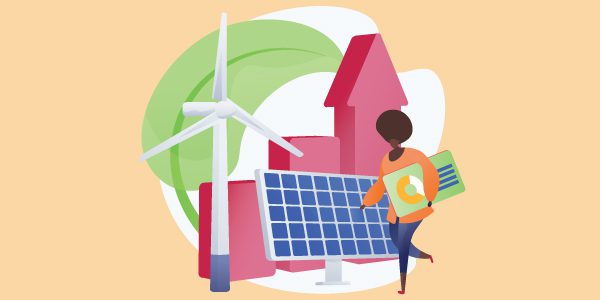This month is Plastic Free July!
In honour of that we are going to look at some of the easiest and best practices your office can do to make your workplace more sustainable and better for the environment.
With the average person producing 2 kg of waste a day, it’s important for businesses to have practices in place to keep waste to a minimum in the office. We should all be doing our part to help the Earth, and here are seven ways to do it.
1. Clear Bin Signage
A very simple way to reduce waste is to have clear signage on or next to the bin area. This reminds workers what can and cannot be recycled. It can be easy to forget what is okay and isn’t okay to go in specific bins. That’s why clear signage can significantly decrease waste; especially as the NSW Environment Protection Authority (EPA) found the typical office waste bin is made up of 76% of paper and cardboard. Being able to correctly segment waste is an important first step in waste management.
2. Adopt a Digital Policy
Annually, offices across the US use 12.1 trillion sheets of paper. Which will come as no surprise when 50% of business waste is made up of paper. For your workplace a digital policy might be an excellent choice to reduce unnecessary paper usage. A digital policy would involve adopting a digital approach to business communications and documents. For example, rather than printing a contract and physically signing it, you would instead use a digital or e-signature.
These are small changes that can have a lasting impact. It can significantly reduce waste, especially as the average employee is printing 6 wasted pages a day, adding up to over a 1,000 wasted pages a year. That’s why you should reevaluate what your business needs; does it require paper in every instance, or can certain practices move to digital? Not just saving paper (and of course the trees!), your business also gets to save money, especially as U.S. businesses reportedly waste US$8 billion a year on just managing paper.
3. Swap That Plastic Cutlery For Stainless Steel
Plastic cutlery is one of the most deadly plastics for our vulnerable marine life. They are typically single-use, and due to their unique shape cannot be recycled. Alarmingly, it’s estimated that it takes over 200 years for plastic cutlery to break down. Having stainless steel options at work so your employees can use those instead is a great way to reduce plastic waste. Stainless steel cutlery can be cleaned and reused time and time again. Even though many takeaway places offer bamboo and other alternatives to plastic cutlery, it’s better to use reusable steel ones instead.
4. Choose Sustainable Suppliers
Waste will always be inevitable, in some way or another. However, aligning yourself with sustainable businesses can still have a positive impact. By using ethical companies, you are doing your part for the environment, and things that are typically wasteful, aren’t so anymore. For example, the company Who Gives A Crap in Australia sells 100% recycled toilet paper, and donates 50% of their profits to building toilets for those in need. Being sustainable doesn’t just have to be for the environment, it can also be in the way of giving back.
5. Keep Energy Usage Low
Simple policies like switching off lights when you aren’t in the room, and turning off the heating or air conditioner are all ways to reduce your energy usage. Also, powering off computers is another way to reduce energy. To implement this, the only work that needs to be done is office-spread awareness. Here it might be good to have signs that remind your employees, especially by the doors.
6. Solar Panels
Solar panels can have high initial costs, but in the long run they can save your business money and keep your office running on renewable energy! When it comes to cost, you should check if your local or state government offers incentives or rebates for installing solar panels. Besides saving the planet, if your solar panels produce excess energy, they can be sold back into the grid. You will then be giving other places power that they need. So it’s a win-win situation.
7. Plants, Plants, Plants
Not just a pretty accessory, plants can provide a multitude of benefits to your office. They can;
-
Improve the office’s air quality
An independent study from the University of Technology Sydney (UTS) found that plants can reduce Volatile Organic Compounds by up to 80% and CO2 by up to 25%.
-
Reduce stress & Anxiety
Stress is a massive problem within the workplace, with 83% of US workers suffering from work-related stress. There have been studies that have found that stress and anxiety can be reduced by active interaction with plants.
-
Increase productivity
It might seem strange but indoor plants have been found to increase levels of productivity. A UK study in fact found it increased employee productivity by up to 15%.
-
Stabilise humidity levels
Humidity is not only uncomfortable to work in, it’s also a breeding ground for mould – which besides being irritating to remove, can emit harmful toxins, which negatively affects the air we breathe. With some types of plants being natural dehumidifiers, they can help reduce humidity levels in the office.












